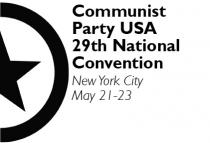 This article is part of the discussion leading up to the Communist Party USA’s 29th National Convention May 21-23, 2010. CPUSA.org takes no responsibility for the opinions expressed in this article or other articles in the pre-convention discussion. All contributions must meet the guidelines for discussion. To read other contributions to this discussion, visit the site of the Pre-Convention Discussion period.
This article is part of the discussion leading up to the Communist Party USA’s 29th National Convention May 21-23, 2010. CPUSA.org takes no responsibility for the opinions expressed in this article or other articles in the pre-convention discussion. All contributions must meet the guidelines for discussion. To read other contributions to this discussion, visit the site of the Pre-Convention Discussion period.
All contributions to the discussion should be sent to discussion2010@cpusa.org for selection not to the individual venues.For more information on the convention or the pre-convention discussion period, you can email convention2010@cpusa.org.
At a time when the Party needs to organize its members in the fight for jobs, healthcare, and against U.S. imperialist ventures, one might ask “what is the relevance of the struggle for democracy in our Party? Is it a diversion from the real tasks at hand?” The answer is NO! On the contrary, it is integrally related to our ability to use all our resources to draw the correct conclusions and to put them into action. If our clubs are the places where ideology and strategy are translated into action and are the direct contact with the masses, then their input is critical to the decision making process even between National Conventions. The following is from a discussion document titled The Nature, Role and Work of the Communist Party written in 2006. Sam Webb is the author.
“Democratic Centralism is the main organizing principle that structures the activity of the Party and the interactions of its various collectives. It strives to unite the Party in its thinking and actions.
“Democratic Centralism isn’t reducible to majority rule or to higher collective bodies exercising authority over lower ones. While both have an important place in the structure of a working-class organization, and especially a revolutionary working-class organization, the main way to mobilize and unite the Party is through political discussions, education and persuasion.
“To accomplish this requires transparency of decisions, mechanisms for communication in all directions, and well functioning collectives at every level of the Party’s structure. Of particular importance in this regard are growing and active clubs, at the grassroots. Such clubs are the main way that we discuss, apply, test, and evaluate our policies, but more about this later.
“We still have much to do to give substance to the concept and practice of democratic centralism. Deepening collective discussions on the main policy questions is one aspect, improving our ability to convey these discussions to every collective in the Party is another, and collectively carrying out and reviewing decisions is critical too.”
Our Party clearly bases itself on the principle of democratic centralism: see P. 6, Article II-Section 1 of our Constitution. It further applies this by guaranteeing the fullest participation of the whole membership in the making of policy change. P. 22 states: “The National Committee shall not make any major policy change until it has submitted the proposed change in draft form to the Party organization for specified periods and for recommendations thereon. In an emergency which must be affirmed by a two thirds vote of the National Committee, the National Committee may adopt another procedure for making a major policy change, including a referendum vote of the entire membership or calling a special delegated conference on a national or regional basis.”
How do we explain the fact that without club participation decisions were made to abandon the printed copy of our press, to stop production of documents, leaflets, etc. except during the election, to eliminate the most important post of Organizational Secretary and the Organization Committee, and to ignore our Constitution with regard to membership and dues?
There has not been created an atmosphere for collective discussion. For example, those of us who opposed going exclusively on line were labeled as anti-technology or on the wrong side of the digital divide. The argument from clubs was not the use of the internet, but to use it side by side with printed materials. When it was suggested at a National Committee meeting that the decision on the paper be postponed until the Convention, it was dismissed on the basis that it would take too much time from other important things.
It is evident that there are important changes taking place, not least the development of the new technology. However, in and of itself these changes do not fully replace the needs of our working class or the instruments of organization for a revolutionary party. It does not take the place of delivery of a bundle of papers to a union hall-the internet cannot replace our press as we march a picket line, demonstrate for peace, for healthcare, for economic needs. It does not replace the face of the Party as we participate in mass struggle with others. Both are vitally necessary. We must frankly discuss these and other results of the precipitous decisions of an organizational and mass character in this convention. Our role in the mass arena can be severely impacted in the days ahead if we by-pass an honest critical examination of our decisions heretofore.
District Committee, Eastern Pennsylvania & Delaware District of the CPUSA


 Join Now
Join Now